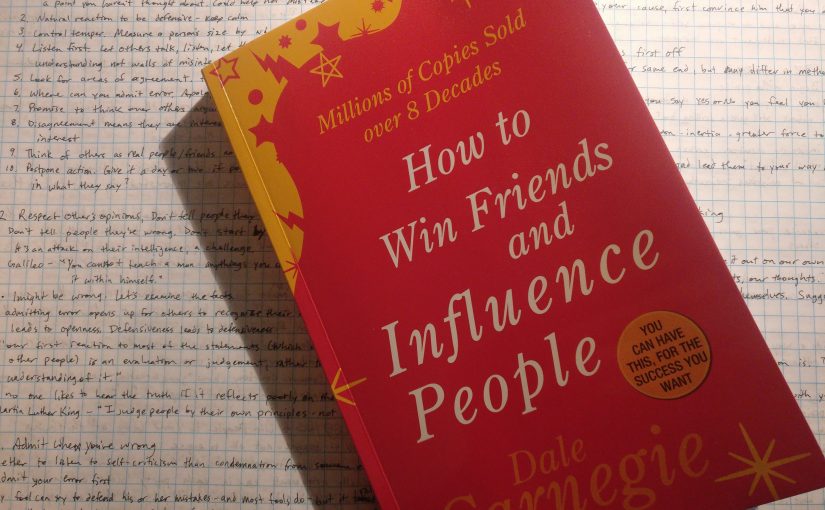Carnegie, D., Carnegie, D., & Thomas, L. (2019). How to win friends and influence people.
This is a highly recommended book from many people. I had a hard time getting through it, though, based on the poor editing, and the plethora of spelling and grammatical errors. I get the appeal of presenting the work as if it were the actual lecture notes from Dale Carnegie himself (or should I write Dale Carnagey, which was his birth name until 1922 when he changed it, perhaps to have his readers subconsciously connect him with Andrew Carnegie?), but at least fix miss-spellings of famous places or people. There is one case where place is spelled three different ways on the same page. And there is even a correct and incorrect spelling in the same sentence. Often it looks like the text was a bad OCR job and nobody bothered to go fix the “l” to an “i” or the “m” to an “rn”. Anyhow, for a book so famous, I can’t see why such errors are not fixed. They would not detract from the message, and in my case, they definitely hurt it.
I obviously didn’t learn much from the book, because I’m breaking three of the “rules” from Part 4: Be a Leader; 1) begin with praise, 2) indirectly mention errors, 3) recognize your own faults first. Well, I certainly have mistakes, in grammar, speling, and tone, but I didn’t make millions off a book with a ton of those errors in them, either.
Anyhow, on to the good stuff. 🙂
The book is broken into four parts:
- How to handle people
- How to get people to like you
- How to get people to think like you
- How to be a leader.
Each of the chapters within the parts have little nuggets of good thoughts and attributes to cultivate in order for you to become a good and wholesome person.
Instead of giving a chapter-by-chapter account of the book, I’ll point out just a few things I found worthwhile of cultivating in myself.
- Don’t criticize, condemn, or complain (see, I haven’t learned that one yet.) (Part 1, Chapter 1)
- The only way to influence other people is to understand what they want and show them how to get it. (p 48) Henry Ford said the secret to success was to get the other’s point of view and see their side just as well as your own. (p 52) Be genuinely interested in other people. (Part 2, Chapter 1) People always do things for a reason. Figure out what their reason is. Try to understand them. Kenneth M. Goode says “stop a minute to contrast your keen interest in your own affairs with your mild concern about anything else.” (158) Assume the best and noblest of others. (Part 3, Chapter 10) Find the best in people and praise them for the good you believe they can do. (p 205)
- Your thoughts determine your reality. Happiness is controlled by our inner conditions, not the outer. (p 78) Elbert Hubbard says, “Thought is supreme, the thought you hold is hourly transforming you into that particular individual.” (p 89) These are the most powerful messages in the whole book. It is little understood and believed, but thoughts are ours to control, and they are the motor that gets all of the other gears of our life to start turning.
- It’s OK to disagree, but not productive to argue. “A misunderstanding is never ended by an argument but by tact, diplomacy, conciliation and a sympathetic desire to see the other person’s viewpoint.” (p 118) Again it really comes down to thinking about and thinking more of others than yourself. We can accomplish so much more when we see ourselves positively and collaboratively connected with others, rather than in competition with them. Get rid of “but” and replace it with “and.” (p 189) Carnegie adds 10 steps from a Bits and Pieces article: (p 119)
- Welcome the disagreement. This could be a learning opportunity.
- Avoid the natural reaction to be defensive.
- Control your temper
- Listen first. Build bridges of understanding not walls of misinterpretation.
- Focus first on where you agree.
- Where can you admit error, and apologize.
- Promise to think over other’s arguments.
- If they disagree with you, that means they are interested in the same thing! Be grateful of their interest.
- Think of others as real people, not opponents.
- Postpone action. Give it a day to think it over.
- To positively influence people into action:
- Be sincere. Do not promise anything you cannot deliver. Forget about the benefits to yourself and concentrate on the benefits to the other person.
- Know exactly what it is you want the other person to do.
- Be empathetic. Ask yourself what it is the other person really wants.
- Match the benefits to the other persons wants.
- Phrase the request so the other person knows the benefit they get.
There is a lot of good practical advice in this book. The main idea is to decide to be a good person and to follow the age old advice of treat others nicely, and the counter-intuitive reminder that to become your BEST self, you need to think of others more.




The challenge I’ve faced has been in interacting with others who have not internalized these tenets. Persuading others to see the world through this lens has proven a much more formidable task than realizing these things for myself.